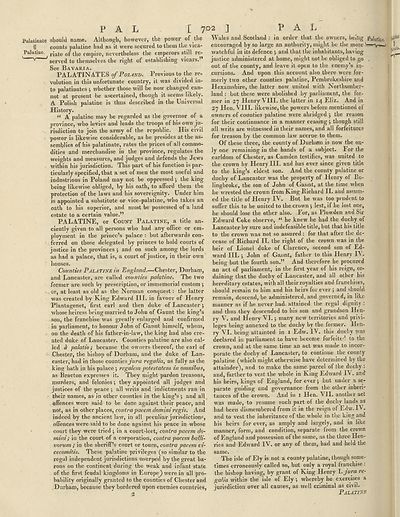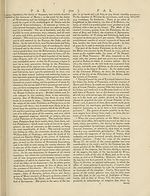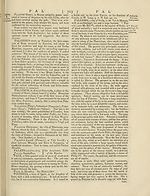Encyclopaedia Britannica > Volume 15, NIC-PAR
(778) Page 702
Download files
Complete book:
Individual page:
Thumbnail gallery: Grid view | List view

PAL [ 702 ] PAL
Palatinate should name. Although, however, the power of the
11 counts palatine had as it tvere secured to them the vica-
Palatine. rJate 0f tJie empire, nevertheless the emperors still re-
v ~ served to themselves the right of establishing vicars.”
See Bavaria.
PALATINATES of Poland. Previous to the re¬
volution in this unfortunate country, it was divided in¬
to palatinates $ whether those will be now changed can¬
not at present be ascertained, though it seems likely.
A Polish palatine is thus described in the Universal
History.
“ A palatine may be regarded as the governor of a
province, who levies and leads the troops of his own ju¬
risdiction to join the army of the republic. His civil
power is likewise considerable, as he presides at the as¬
semblies of his palatinate, rates the prices of all commo¬
dities and merchandise in the province, regulates the
weights and measures, and judges and defends the Jews
within his jurisdiction. This part of his function is par¬
ticularly specified, that a set of men the most useful and
industrious in Poland may not be oppressed $ the king
being likewise obliged, by his oath, to afford them the
protection of the laws and his sovereignity. Under him
is appointed a substitute or vice-palatine, who takes an
oath to his superior, and must be possessed of a land
estate to a certain value.”
PALATINE, or Count Palatine, a title an¬
ciently given to all persons who had any office or em¬
ployment in the prince’s palace : but afterwards con¬
ferred on those delegated by princes to hold courts of
justice in the provinces ; and on such among the lords
as had a palace, that is, a court of justice, in their own
houses.
Co7/?ities Palatine in England.—Chester, Durham,
and Lancaster, are called counties palatine. The two
former are such by prescription, or immemorial custom •,
or, at least as old as the Norman conquest: the latter
was created by King Edward III. in favour of Henry
Plantagenet, first earl and then duke of Lancaster ;
whose heiress being married to John of Gaunt the king’s
son, the franchise was greatly enlarged and confirmed
in parliament, to honour John of Gaunt himself, whom,
on the death of his father-in-law, the king had also cre¬
ated duke of Lancaster. Counties palatine are also cal¬
led a palatio; because the owners thereof, the earl of
Chester, the bishop of Durham, and the duke of Lan¬
caster, had in those counties jWa regalia, as fully as the
king hath in his palace ; regalem potestatem in omnibus,
as Bracton expresses it. They might pardon treasons,
murders, and felonies; they appointed all judges and
justices of the peace} all writs and indictments ran in
their names, as in other counties in the king’s \ and all
offences were said to be done against their peace, and
not, as in other places, contrapacem domini rcgis. And
indeed by the ancient law, in all peculiar jurisdictions,
offences were said to be done against his peace in whose
• court they were tried ; in a court-leet, contra pacem do¬
mini; in the court of a corporation, contra pacem balli-
vorum ; in the sheriff’s court or tourn, contra pacem vi-
cecomitis. These palatine privileges (so similar to the
regal independent jurisdictions usurped by the great ba¬
rons on the continent during the weak and infant state
of the first feudal kingdoms in Europe^ were in all pro¬
bability originally granted to the counties of Chester and
Durham, because they bordered upon enemies countries,
2
Wales and Scotland : in order that the owners, being ^alatW, I*'*1'11'
encouraged by so large an authority, might be the more l—-v—e 1
watchful in its defence j and that the inhabitants, having
justice administered at home, might not be obliged to go .
out of the county, and leave it open to the enemy’s in¬
cursions. And upon this account also there were for¬
merly two other counties palatine, Pembrokeshire and
Hexamshire, the latter now united with Northumber¬
land : but these were abolished by parliament, the for¬
mer in 27 Henry VIII. the latter in 14 Eliz. And in
27 Hen. VIII. likewise, the powers before mentioned of
owners of counties palatine were abridged ; the reason
for their continuance in a manner ceasing j though still
all writs are witnessed in their names, and all forfeitures
for treason by the common law accrue to them.
Of these three, the county of Durhanm is now the on¬
ly one remaining iu the hands of a subject. lor the
earldom of Chester, as Camden testifies, was united to
the crown by Henry III. and has ever since given title
to the king’s eldest son. And the county palatine or
duchy of Lancaster was the property of Henry of Bo-
lingbroke, the son of John of Gaunt, at the time when
he wrested the crown from King Richard II. and assum¬
ed the title of Henry IV. But he was too prudent to
sufler this to be united to the crown 5 lest, if he lost one,
he should lose the other also. lor, as Plow den and Sir
Edward Coke observe, “ he knew he had the duchy of
Lancaster by sure and indefeasible title, but that his title
to the crown was not so assured : for that after the de¬
cease of Richard II. the right of the crown was in the
heir of Lionel duke of Clarence, second son of Ed¬
ward III.; John of Gaunt, father to this Henry IV.
being but the fourth son.” And therefore he procured
an act of parliament, in the first year of his reign, or¬
daining that the duchy of Lancaster, and all other his
hereditary estates, with all their royalties and franchises,
should remain to him and his heirs for ever j and should
remain, descend, be administered, and governed, in like
manner as if he never had attained the regal dignity :
and thus they descended to his son and grandson Hen¬
ry V. and Henry VI. j many new territories and privi¬
leges being annexed to the duchy by the former. Hen¬
ry VI. being attainted in 1 Edw. IV. this duchy was
declared in parliament to have become forfeited to the
crown, and at the same time an act Was made to incor¬
porate the duchy of Lancaster, to continue the county
palatine (which might otherwise have determined by the
attainder), and to make the same parcel of the duchy :
and, farther to vest the whole in King Edward I\ . and
his heirs, kings of England, for ever •, but under a se¬
parate guiding and governance from the other inheri¬
tances of the crown. And in 1 Hen. VII. another act
wras made, to resume such part of the duchy lands as
had been dismembered from it in the reign of Edw. IV.
and to vest the inheritance of the whole in the king and
his heirs for ever, as amply and largely, and in like
manner, form, and condition, separate from the crown
of England and possession of the same, as the three Hen¬
ries and Edward IV. or any of them, had and held the
same.
The isle of Ely is not a county palatine, though some¬
times erroneously called so, but only a royal franchise :
the bishop having, by grant of King Henry l.jura re¬
galia within the isle of Ely •, whereby he exercises a
jurisdiction over all causes, as well criminal as civil.
Palatine
Palatinate should name. Although, however, the power of the
11 counts palatine had as it tvere secured to them the vica-
Palatine. rJate 0f tJie empire, nevertheless the emperors still re-
v ~ served to themselves the right of establishing vicars.”
See Bavaria.
PALATINATES of Poland. Previous to the re¬
volution in this unfortunate country, it was divided in¬
to palatinates $ whether those will be now changed can¬
not at present be ascertained, though it seems likely.
A Polish palatine is thus described in the Universal
History.
“ A palatine may be regarded as the governor of a
province, who levies and leads the troops of his own ju¬
risdiction to join the army of the republic. His civil
power is likewise considerable, as he presides at the as¬
semblies of his palatinate, rates the prices of all commo¬
dities and merchandise in the province, regulates the
weights and measures, and judges and defends the Jews
within his jurisdiction. This part of his function is par¬
ticularly specified, that a set of men the most useful and
industrious in Poland may not be oppressed $ the king
being likewise obliged, by his oath, to afford them the
protection of the laws and his sovereignity. Under him
is appointed a substitute or vice-palatine, who takes an
oath to his superior, and must be possessed of a land
estate to a certain value.”
PALATINE, or Count Palatine, a title an¬
ciently given to all persons who had any office or em¬
ployment in the prince’s palace : but afterwards con¬
ferred on those delegated by princes to hold courts of
justice in the provinces ; and on such among the lords
as had a palace, that is, a court of justice, in their own
houses.
Co7/?ities Palatine in England.—Chester, Durham,
and Lancaster, are called counties palatine. The two
former are such by prescription, or immemorial custom •,
or, at least as old as the Norman conquest: the latter
was created by King Edward III. in favour of Henry
Plantagenet, first earl and then duke of Lancaster ;
whose heiress being married to John of Gaunt the king’s
son, the franchise was greatly enlarged and confirmed
in parliament, to honour John of Gaunt himself, whom,
on the death of his father-in-law, the king had also cre¬
ated duke of Lancaster. Counties palatine are also cal¬
led a palatio; because the owners thereof, the earl of
Chester, the bishop of Durham, and the duke of Lan¬
caster, had in those counties jWa regalia, as fully as the
king hath in his palace ; regalem potestatem in omnibus,
as Bracton expresses it. They might pardon treasons,
murders, and felonies; they appointed all judges and
justices of the peace} all writs and indictments ran in
their names, as in other counties in the king’s \ and all
offences were said to be done against their peace, and
not, as in other places, contrapacem domini rcgis. And
indeed by the ancient law, in all peculiar jurisdictions,
offences were said to be done against his peace in whose
• court they were tried ; in a court-leet, contra pacem do¬
mini; in the court of a corporation, contra pacem balli-
vorum ; in the sheriff’s court or tourn, contra pacem vi-
cecomitis. These palatine privileges (so similar to the
regal independent jurisdictions usurped by the great ba¬
rons on the continent during the weak and infant state
of the first feudal kingdoms in Europe^ were in all pro¬
bability originally granted to the counties of Chester and
Durham, because they bordered upon enemies countries,
2
Wales and Scotland : in order that the owners, being ^alatW, I*'*1'11'
encouraged by so large an authority, might be the more l—-v—e 1
watchful in its defence j and that the inhabitants, having
justice administered at home, might not be obliged to go .
out of the county, and leave it open to the enemy’s in¬
cursions. And upon this account also there were for¬
merly two other counties palatine, Pembrokeshire and
Hexamshire, the latter now united with Northumber¬
land : but these were abolished by parliament, the for¬
mer in 27 Henry VIII. the latter in 14 Eliz. And in
27 Hen. VIII. likewise, the powers before mentioned of
owners of counties palatine were abridged ; the reason
for their continuance in a manner ceasing j though still
all writs are witnessed in their names, and all forfeitures
for treason by the common law accrue to them.
Of these three, the county of Durhanm is now the on¬
ly one remaining iu the hands of a subject. lor the
earldom of Chester, as Camden testifies, was united to
the crown by Henry III. and has ever since given title
to the king’s eldest son. And the county palatine or
duchy of Lancaster was the property of Henry of Bo-
lingbroke, the son of John of Gaunt, at the time when
he wrested the crown from King Richard II. and assum¬
ed the title of Henry IV. But he was too prudent to
sufler this to be united to the crown 5 lest, if he lost one,
he should lose the other also. lor, as Plow den and Sir
Edward Coke observe, “ he knew he had the duchy of
Lancaster by sure and indefeasible title, but that his title
to the crown was not so assured : for that after the de¬
cease of Richard II. the right of the crown was in the
heir of Lionel duke of Clarence, second son of Ed¬
ward III.; John of Gaunt, father to this Henry IV.
being but the fourth son.” And therefore he procured
an act of parliament, in the first year of his reign, or¬
daining that the duchy of Lancaster, and all other his
hereditary estates, with all their royalties and franchises,
should remain to him and his heirs for ever j and should
remain, descend, be administered, and governed, in like
manner as if he never had attained the regal dignity :
and thus they descended to his son and grandson Hen¬
ry V. and Henry VI. j many new territories and privi¬
leges being annexed to the duchy by the former. Hen¬
ry VI. being attainted in 1 Edw. IV. this duchy was
declared in parliament to have become forfeited to the
crown, and at the same time an act Was made to incor¬
porate the duchy of Lancaster, to continue the county
palatine (which might otherwise have determined by the
attainder), and to make the same parcel of the duchy :
and, farther to vest the whole in King Edward I\ . and
his heirs, kings of England, for ever •, but under a se¬
parate guiding and governance from the other inheri¬
tances of the crown. And in 1 Hen. VII. another act
wras made, to resume such part of the duchy lands as
had been dismembered from it in the reign of Edw. IV.
and to vest the inheritance of the whole in the king and
his heirs for ever, as amply and largely, and in like
manner, form, and condition, separate from the crown
of England and possession of the same, as the three Hen¬
ries and Edward IV. or any of them, had and held the
same.
The isle of Ely is not a county palatine, though some¬
times erroneously called so, but only a royal franchise :
the bishop having, by grant of King Henry l.jura re¬
galia within the isle of Ely •, whereby he exercises a
jurisdiction over all causes, as well criminal as civil.
Palatine
Set display mode to:
![]() Universal Viewer |
Universal Viewer | ![]() Mirador |
Large image | Transcription
Mirador |
Large image | Transcription
Images and transcriptions on this page, including medium image downloads, may be used under the Creative Commons Attribution 4.0 International Licence unless otherwise stated. ![]()
| Encyclopaedia Britannica > Encyclopaedia Britannica > Volume 15, NIC-PAR > (778) Page 702 |
|---|
| Permanent URL | https://digital.nls.uk/192591812 |
|---|
| Attribution and copyright: |
|
|---|
| Shelfmark | EB.11 |
|---|---|
| Description | Ten editions of 'Encyclopaedia Britannica', issued from 1768-1903, in 231 volumes. Originally issued in 100 weekly parts (3 volumes) between 1768 and 1771 by publishers: Colin Macfarquhar and Andrew Bell (Edinburgh); editor: William Smellie: engraver: Andrew Bell. Expanded editions in the 19th century featured more volumes and contributions from leading experts in their fields. Managed and published in Edinburgh up to the 9th edition (25 volumes, from 1875-1889); the 10th edition (1902-1903) re-issued the 9th edition, with 11 supplementary volumes. |
|---|---|
| Additional NLS resources: |
|

